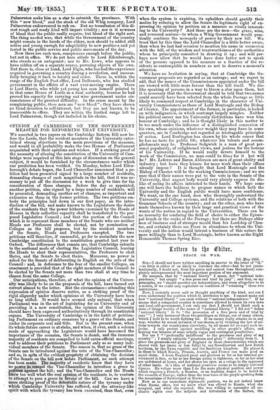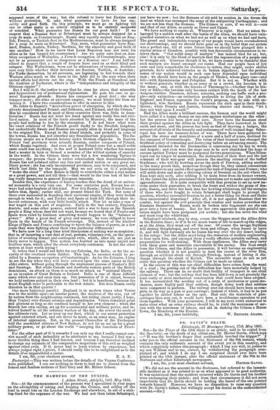Irtttrs tu tbr (nitur. PEACE OR WAR. 7th May 1855.
Six—I should not have written anything in answer to the letter of "G." —so little is either of us likely to convince the other—had he not (unin- tentionally, I doubt not, from his grave and earnest tone throughout) com- pletely misrepresented the most important portion of my argument. He assumes, that by "national liberty" I mean, not "national inde- pendence," but simply "a free press and trial by jury" ; and that, on my principles, we "should sacrifice our independence, and cease altogether to be a nation, if we could only capitulate on condition of "retaining " those two institutions.
Now, I certainly never said or thought anything of the kind, nor can I even understand the position which G. attributes to me. I cannot make out how "national liberty " can exist without " national independence." If he means that a conquered country is sometimes allowed to retain its own laws and local self-government, I can only say that I should not think such a state of things worthy of the name of "national liberty." I did not" define national liberty' to ho the possession of a free press and of trial by jury ' "; I only instanced those two privileges as things, out of many others, which I hold to be worth fighting for. If an enemy really attacks us in any way, whether by actual invasion of our shores, or by violating the law of na- tions towards our countrymen elsewhere, by all means let us repel such in- juries. I only protest against meddling in other people's affairs, and making war because of some utterly vague and contingent possibilities. Nor am I " ' profoundly indifferent' to the greatness and glory of my country" ; I simply estimate "greatness and glory" differently from G. I place the greatness and glory of England in those characteristics which are shared with her (more or less fully) by our Scandinavian and Low Dutch brethren, by the Swiss republic and the Sardinian kingdom. Ile places it in those to which Russia, Prussia, Austria, and France can make good an equal claim. I deem England great and glorious so far as her internal go- vernment' is free, so far as her foreign policy is righteous, so far as her sons are unfettered at home, and her shores are open as a refuge to the oppressed of other lands. G.'s idea of national greatness seems to be simply national bigness. Ile values more than I do the mere physical position and power which requires a French, Russian, or an Austrian despot to be heard in the councils of Europe, rather than the true voice of the people speaking from the mountains of Switzerland or Norway. Now as to our immediate diplomatic position, we do not indeed know what Russia offers, but we know what was offered to Russia, what she accepted, and what she rejected. She was willing to surrender all ex- clusive rights over the subjects and tributaries of the Sultan, the sup cause of the war; but she refused to leave her Euxine coast wag:etc' protection. G. asks what guarantee we have for her sin- cerity and good faith. On this principle, we must go on fighting till one or other party is so utterly crippled as to be entirely incapable of mischief. 'What guarantee has Russia for our good faith ? If we suspect that a Russian fleet at Sebastopol must be always designed for a coup de main on Constantinople, Russia may equally suspect that an Eng- lish, French, or Turkish fleet in the Mediterranean, must be always designed for a coup de main on Sebastopol. Nay, more, what guarantee have Eng- land, France, Austria, Turkey, Sardinia, for the sincerity and good faith of one another ? How do we know that Louis Napoleon may not treat his allies as he has treated his countrymen ? Are we quite sure that an Aus- trian occupation of Wallachia, a French occupation of Constantinople, may not be as permanent and as dangerous as a Russian one ? I am half in- clined to suspect that a couple of despots have used us as their blind and catspaw. The Wallachians, worn out by alternations of tyranny, doubtless care very little whether their invaders are Russian, Turkish, or Austrian ; the Turks themaelves, by all accounts, are beginning to feel towards their Western allies much as the horse in the fable did to the man when their united efforts had driven out the stag. With the Frank at Stamboul and the Austrian at Bucharest, where is the "independence and integrity of the Ottoman empire" ? But I will do G. the justice to say that he rises far above that miserable and hypocritical cry of professional diplomatists. He puts his case on ge- neral European grounds : Russia has conquered a great deal ; she may conquer more she aims at universal empire; we must hinder her from at- taining it. more; two considerations to offer in answer to this. He refers to Russia's "marvellous power of absorption, by which she has already denationalized Poland, and Esthonia, and Finland, and the Crimea." Has he considered that in most of these countries there was little to dena- tionalize ? Russia has not tried her hand against any really free and civi- lized nation. In most of the lands absorbed by Muscovy, the mass of the people had nothing to lose by the absorption. I do not know what were the exact relations of the Finnish grand duchy to the Swedish kingdom, but undoubtedly Swede and Russian are equally alien in blood and language to the original Fin. Except in the Aland islands, and probably in some of the towns, Russia has not absorbed any Scandinavian population. The Es- thonian people are a Finnish helotry under German oligarchs. In Eastern Poland vast provinces were actually Russian, earlier conquests of Poland, which Russia regained. And even in proper Poland none but a small noble caste could lose anything; to the serf it mattered little whether his master had a master in turn or formed a member of the wildest system of anarchy in the world. In the Crimea there were but a few wandering Tartars to conquer; the process there is rather colonization than denationalization. Russia has not subdued either any free and united nation or any great mi- litary power • she has only incorporated provinces, easy to be conquered, and which lost little by the conquest. May we not even on G.'s principles "make the stand" when Russia is likely to overwhelm either a real nation or a great power, and not till then ?—that would be the true test of her be- ing really dangerous to general European interests. Beside, this, the experience of history teaches that the dread of an univer- sal monarchy is a very vain one. For some centuries past, Europe has al- ways had some bugbear of this kind. Now it is Russia ; before it was Prance; before that, Spain; earlier still, our present friend the Turk. But none of these ever succeeded in founding their universal empire, if they were foolish enough to wish for it; and Turkey and Spain at least fell through their in- herent rottenness, with very little hostile attack. Now let us take a case of war waged on this sort of suspicion. Early in the last century, England, Austria, and some other powers entered into a war to force on the Spanish people a King whom they did DA want, because we feared that if France and Spain were ruled by kinsmen something would happen to the "balance of power." After a great deal of glory and misery, we were obliged to leave Spain in the hands of its French sovereign. But, instead of the kindred Kings of Spain and France combining to upset the balance of power, in a few years they were fighting about their own particular differences ! We have now for a long time tried this system of making war on suspicion ; that is, of incurring a vast deal of real, present, voluntary evil, on the specu- lation of avoiding distant and contiugent evils, which, after all, are just as likely never to happen. This system has hurried us into many unjust and fruitless wars, which after the event everybody condemns. Is not the other system at least worth trying ? G. infers that I would not -fight for our Colonies, for India, or for the se- curity of the overland route thither. This last, he assumes would be pe- rilled by a Russian occupation of Constantinople. As for the Colonies, I long to see the day when they will have entered upon the same career as their elder sisters, without going through the unpleasant process of Bunker's Hill and Saratoga. But while Canada and Australia remain parts of the British dominions, an attack on them is as much an attack on "national liberty" as an invasion of Great Britain or Ireland. India is one of those difficult eases which ever and anon turn up. Our possession of it is unjust, because we hold nations subject in their own land ; but it is beneficent, because the worst English ruler is preferable to the best Asiatic. But does Russia really threaten us in that quarter ? One more historical parallel. England is in modern times what Venice was in the middle ages—an insular power, the mistress of the seas, cut off by nature from the neighbouring continent, but ruling (more justly, I hope, than Venice) over distant colonies and dependencies. Venice remained great and glorious as long as she confined herself to her own element ; when she forsook her own calling, set up for a continental and military power, and in- volved herself in all the ordinary warfare of the day, she sowed the seeds of her ultimate ruin. Let us keep up our fleet, which is our surest protection against external attack, and can never be made, as an army may, an engine of internal oppression. But, as the present Chancellor of the Exchequer told the assembled citizens of New Radnor, do not let us set up for a great military power, or go about the world "usurping the functions of Provi- dence.'
For the other pert of G.'s remarks I can only say that I really cannot con- vict myself of such imbecility as he attributes to me, because I find war a more terrible thing than I had fancied, and because I am therefore inclined to change my estimate of the comparative magnitude of this evil as weighed against other evils. If G. never had to learn wisdom by experience, but always judged right priori, I should really like to be enlightened as to the details of so unparalleled a career.
I am, Sir, your obedient servant, E. A. F. .Postscript—This was written before the details of the Vienna Conference were published. I can see nothing in them to lead me to dissent from the honest and fearless motions of Earl Grey and Mr. Milner Gibson.



























 Previous page
Previous page